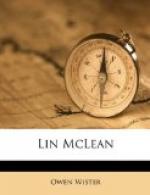“Stay with it, Jim!” they shouted. “You’re a king!”
A steep ditch lay across the flat where he was veering, abrupt and nearly hidden; but his eye caught the danger in time, and swinging from it leftward so that two wheels of the leaning coach were in the air, he faced the open again, safe, as the rescue swooped down upon him. The horsemen came at the ditch, a body of daring, a sultry blast of youth. Wheeling at the brink, they turned, whirling their long ropes. The skilful nooses flew, and the ponies, caught by the neck and foot, were dragged back to the quadrangle and held in line. So the pageant started the wild ponies quivering but subdued by the tightened ropes, and the coffin steady in the ambulance beneath the driver. The escort, in their fringed leather and broad hats, moved slowly beside and behind it, many of them swaying, their faces full of health, and the sun and the strong drink. The women followed, whispering a little; and behind them the slow dray jolted, with its heaps of men waking from the depths of their whiskey and asking what this was. So they went up the hill. When the riders reached the tilted gate of the graveyard, they sprang off and scattered among the hillocks, stumbling and eager. They nodded to Barker and McLean, quietly waiting there, and began choosing among the open, weather-drifted graves from which the soldiers had been taken. Their figures went up and down the uneven ridges, calling and comparing.
“Here,” said the Doughie, “here’s a good hole.”
“Here’s a deep one,” said another.
“We’ve struck a well here,” said some more. “Put her in here.”
The sand-hills became clamorous with voices until they arrived at a choice, when some one with a spade quickly squared the rain-washed opening. With lariats looping the coffin round, they brought it and were about to lower it, when Chalkeye, too near the edge, fell in, and one end of the box rested upon him. He could not rise by himself, and they pulled the ropes helplessly above.
McLean spoke to Barker. “I’d like to stop this,” said he, “but a man might as well—”
“Might as well stop a cloud-burst,” said Barker.
“Yes, Doc. But it feels—it feels like I was looking at ten dozen Lin McLeans.” And seeing them still helpless with Chalkeye, he joined them and lifted the cow-boy out.
“I think,” said Slaghammer, stepping forward, “this should proceed no further without some—perhaps some friend would recite ‘Now I lay me?"’
“They don’t use that on funerals,” said the Doughie.
“Will some gentleman give the Lord’s Prayer?” inquired the coroner.




